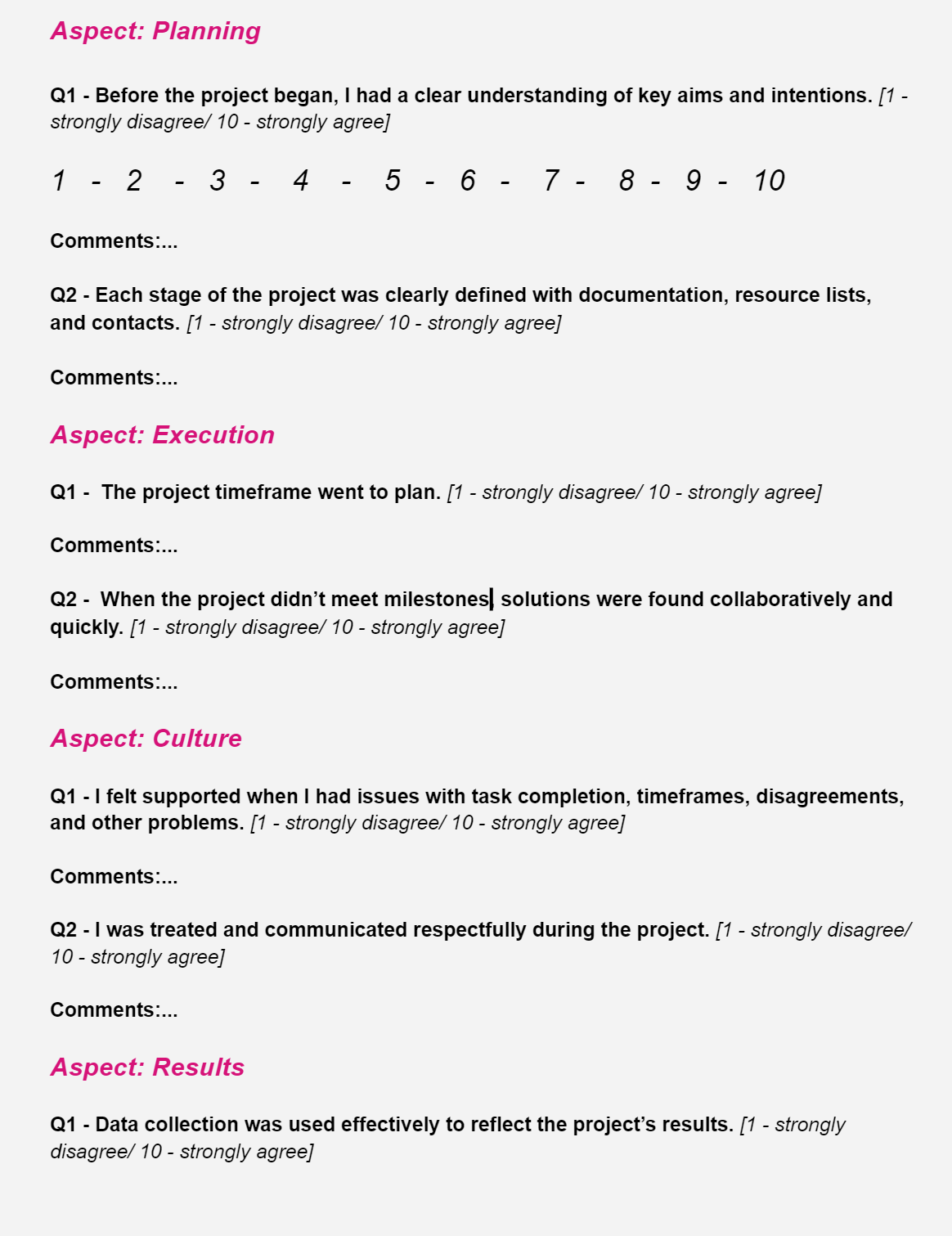Skills Hub
While processes and tools are important, project success is heavily dependent on a PM’s ability to lead, facilitate and empower their teams.

Good project managers are proactive, adaptive, decisive, and above all, excellent communicators: skills they will continue to hone throughout their careers.
We’ve put together a list of the key habits you can foster - both on and off the project - that will help you sprint down the road towards project success.
Build a project overview
Know your team
Start with clear aims and roles
Create a team identity and culture
Operate a visible and immersive framework
Maintain a safe, transparent environment
See each project as a learning curve
Know yourself, the good and the bad
Stay curious!
If you need talent for your team, whether that be researchers to collect data, analysts to interpret it, or industry experts, we can help.
1) Build a project overview.
Assess the project thoroughly before starting. The more you know, the better you’ll plan. Think about:
Stakeholders: who’s the key stakeholder and what does success look like for them? Is this realistic? Who are the other stakeholders and who can you go to for support? Is anyone likely to be resistant?
Context: why is this project happening (really)? Why now? Where does it fit in terms of broader business strategy? What are the consequences of roadblocks and potential failure?
Timeframes & budget: how long will each stage of the project take? Is there room for delays, and where might they come from? Has each resource been costed effectively?
By understanding the above, you’ll also be in a stronger position to negotiate the timeframe, budget, and resources with any relevant stakeholders. And you’ll be able to present your team with a far more compelling case for the project.
Project Budget Template
Don’t know where to start with draft budgeting? An easy way to collate information is by using a simple budget template, as shown by ProjectManager below. The key is to be organised.
2) Know your team.
The better you know your team, and understand their strengths, communication styles and their broader contexts, the more effectively you’ll work with them.
You’ll be able to assign roles and tasks that play to their strengths, spot problems earlier, and be more easily able to deal with conflict. You’ll also build trust.
Of course, this also applies to the whole team - the more they are connected, the higher the chance that they will perform well together.
Get the facts: who’s in your team? Are they full-time employees, freelance contractors or a combination? How long have they been with the business? Are they remote or hybrid? Are they on other projects too? What are their key strengths or areas for development?
Take an interest: this isn’t about prying; it’s about checking in.
Arrange pure social time: maybe it’s a Friday breakfast, or you plan to finish early once a month for some RnR. Ask the team what works for them!
Want practical tips on how to build a project team? Find out more here.
3) Start with clear aims and clear roles.
In order to buy in, people need to understand the project goal, the impact of success, the broader context and how their role fits in. Clarity and transparency are everything.
Make sure everyone is on the same page in terms of the big picture. Explain your role too, and be specific about your responsibilities. By communicating your expectations from the project and the roadmap for achieving those goals, you’ll offer a sense of clarity.
During this time, it’s important to avoid a dictator management style. Giving space for questions and challenges from your team is important. Not only does it allow each person the freedom to express their opinion, which can increase morale (an important aspect identified below), but your team may identify a problem or even a solution that you haven’t spotted.
Now, that’s important. Don’t let ego get in the way of finding a solution. Be selfless and think of your team before acting on an innate urge to impress. Projects are bound to go off-track sometimes; it’s inevitable. The important issue is how you recentre your team on a new track, and often this comes down to culture.
4) Create a team identity and culture.
Create something specific that people feel part of. It’s hard to get excited about an ERP system implementation project. Give it a name. It’s fun, it’s a good shorthand for the vision, and it’s a great platform from which to build a team identity and culture.
Work collaboratively. As Steve Jobs says,
“Great things in business are never done by one person; they’re done by a team of people.”
Define and agree on group behaviours and ways of working. You’ll move forward with more energy and buy-in, and you’ll have something concrete to return to if things are going off-piste.
Create a team contract: understand how people like to work, what’s going to be the best way of making everyone accountable, what people need in order to perform well, and consider what has worked well or badly on previous projects.
Consult on the plan: listen to your team, and use their expertise, insights, and recommendations to hone the roadmap - you’ll build a stronger platform for accountability.
Communicate processes clearly: how will feedback work? How will conflict be addressed? How will updates work? How will the team be accountable?
5) Create a visible and immersive framework.
Out of sight is out of mind. Whether your team is remote, hybrid or all together in the office, a visible framework that contains, supports and connects people to the project - and each other - is essential for motivation, accountability and success.
Select processes and tools carefully: what’s available? Are there standard processes or digital tools you can use? Are they fit for purpose? Make sure people understand why they’ve been chosen, what they are and how to use them. If something isn’t working, change it!
Meetings: what’s the meeting cadence? Daily standups? Weekly all hands? Be specific about what meetings are for, keep tabs on their effectiveness and adapt accordingly. If the weekly all-hands centres on progress updates from the team leaders, how do you get more junior voices involved? Having people in a room is a chance to culture-build and maintain buy-in, as well as discuss problems and update on progress.
6) Maintain a safe, transparent environment.
A team that feels safe will perform better. Indecisive, erratic leadership creates fear and instability and kills momentum.
But how can you nurture a safe environment for so many different personalities and needs? The University of Alberta’s comprehensive breakdown of work environment is a broad overview that can be used to adapt to your team.
You can split these through both personal attitude and formal process.
Your Attitudes:
Be consistent: emotionally and structurally (stick to reporting structures etc. - if they need changing, communicate).
Make decisions quickly: consult if you need to - but make firm decisions and communicate them clearly. If you need to row back on a decision, explain why.
Be proactive: stay a step ahead of your team and your stakeholders, and anticipate issues.
Manage long as well as short-term deadlines: keep the macro in view. And make sure everyone (including clients/stakeholders) stays up to date on project progress.
Stay open to learning: you definitely don’t know everything. If you’re not the expert on a particular aspect of the project. That’s ok. Consult with the person who is. If deadlines are being missed, is it because they’re unrealistic? Talk to the team. Mistakes happen to everyone. How can you recognise, accept, and grow from them?
Be ready to coach: of course, you may need to instruct and direct, but a good project manager will empower their teams, encourage their development and deepen trust and efficiency as a result.
Your Processes:
Organise reflection meetings: creating communicative platforms is key. Schedule weekly or monthly meetings where you can collaborate on problems and progress as a team.
Celebrate success and people: Use tools or tactics such as Slack shoutouts, weekly nominations, individual thank-yous to create the space for people to feel seen and valued.
Ensure conflicts can be voiced: conflict often arises because people have different communication styles: resolution might be as simple as you ‘translating’. But most importantly, give your team tools in which to voice conflicts or concerns. Whether that be an anonymous form or HR contact.
Look after your team and your stakeholders: build respect, loyalty and trust with both the team and stakeholders. If your stakeholders are engaged, up to date and managed well, they’re more likely to listen when you need to push back. If everyone’s been working flat out for a deadline, give them a break, don’t make them ask for it. If your stakeholders are disengaged, or your team burns out, everyone suffers.
7) See each project as a learning curve.
Whether it was a roaring success or an abject failure, you will have learned a lot through project management. Actions after a project might include:
Debrief: give people an opportunity to reflect and give feedback. What worked? What didn’t? What would you do differently? Articulate this for yourself too.
Mark the ending: you’ve been on a journey. Celebrate if possible. At the very least, send an email, thank people, and acknowledge their contributions.
Create a lessons learned survey: Document your journey and record the feedback for future projects.
End-of-Project Survey Template

After you’ve collected the data, you can begin to collate a report that can be shared with the internal team as well as stakeholders.
Now, when you start another project, you can retrace your past lessons and make adjustments to the process as necessary.
8) Know yourself, the good and the bad.
Identify what you need to create a good balance in your life. A stressed-out leader = a stressed-out team, and it’s far harder to work efficiently and make strong decisions if you’re in a poor frame of mind.
Long hours and late nights at crunch points are one thing, but if you have no time to relax, exercise, eat well, see friends, or partake in hobbies, then you need to take action. Identify your in-work support structures, too: who can you lean on for mentoring or guidance?
Understanding your own motivations and reactions, where your energy comes from, and your strengths, as well as your blind spots, will help you manage yourself and others. You’ll be better placed both to let your team know what to expect from you and to understand their needs and expectations.
And you’ll likely make stronger decisions and build deeper trust with your team. You can:
Take time to reflect: What are your values? Your strengths? What are your blind spots? What motivates you? Where are your boundaries? What’s your leadership style - and how do you like to work with other people? What do you expect from them?
Look online: from psychometric assessments to strength frameworks to coaching courses; there’s plenty of help available.
9) Finally, stay curious!
Talk to your team, go to conferences, read, listen to podcasts and videos, and build your network. Share your own stories of triumph (and disaster!). The more connected you are, the bigger the network you’ll have to draw on for resources and advice and the better equipped you’ll be to manage the next project!
At Freshminds, our exceptional permanent and freelance network means we can connect you with a team of researchers, analysts and sector experts to bolster your team. Speak to our team for even more information.